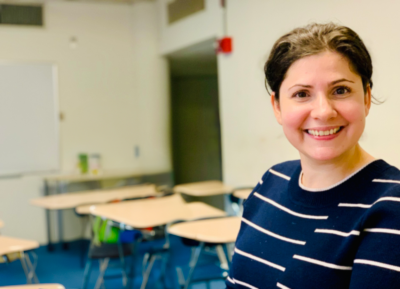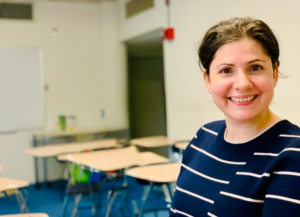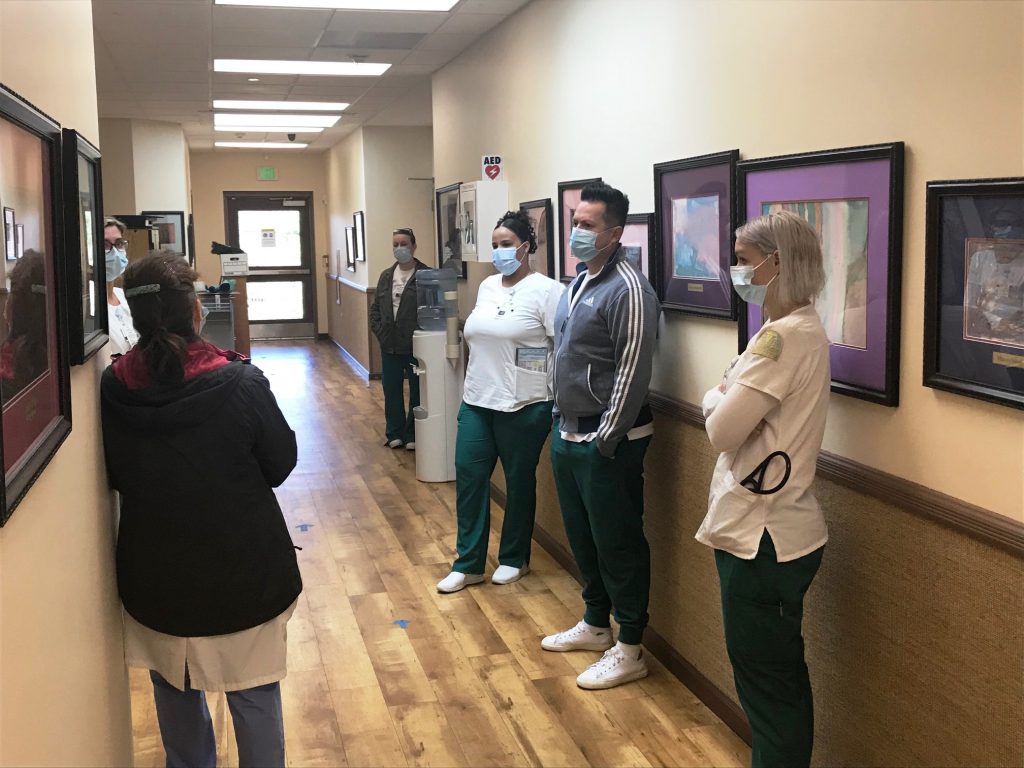By Laura Spinu, Ph.D.
with Ebony Goldman
Special to Campus News
When I arrived at Kingsborough Community College to interview to be a professor eight years ago, I read “Dreams begin here” at the main gate and smiled, thinking it a grandiose motto.
Now, when I see the words, many of my students’ faces come to mind, accompanied by my own joy and awe at their achievements. All of these successful students got involved in STEM research early in their academic careers through K-CORE, a collaborative research bootcamp for Kingsborough Community College students, that I started in 2019.
Since then, over 40 students have presented their research at conferences in the U.S. and abroad, and several have had research papers published in science journals. One student contributed to a book chapter on the impact of early language exposure, and many have won awards and scholarships. Graduates have been accepted to master’s and doctoral programs at CUNY, New York University, Yale, and Princeton. Others landed their dream jobs.
Such success is proof that conducting research in a STEM discipline as an undergraduate, especially at a community college, can transform a student’s life and career.
But, like many fulfilling experiences, research is also challenging. So, I invited Ebony Goldman, a Speech-Language-Sciences Ph.D. student at the CUNY Graduate Center and a K-CORE research assistant, to share advice on how to excel as an undergraduate researcher. To each of her tips, I’ve added my own take.
Here are five ways to reap the rewards of STEM research.
- Create a Support Network
Ebony: Research is exciting, but you can also feel isolated when dealing with its responsibilities. Lean on those around you for support. While you may have a research mentor, their time may be limited. I have found it extremely useful to reach out to advanced students or other faculty members so that if I have a question or need advice, there is someone to ask. It’s also great to rely on your friends and family. They may not fully understand your research qualms, but they can help you vent school-related frustrations.
Laura: The notion of the scientist struggling alone is a myth. Success, instead, stems from a dynamic, cohesive, and motivated research team that produces groundbreaking work. There are many communities within the metaphorical walls of a community college. Network with faculty and fellow students within and outside of your major or department. Tomorrow’s thought leaders are today’s students.
- Seek out third spaces
Ebony: I’ve found it useful to find new and fun places to work beyond the lab and the library; the change in scenery can help to decompress and inspire me. Consider cafés, public libraries, and parks. Even moving to a different building or room in your school or home can help.
Laura: Also consider attending local workshops, conferences, summer schools, symposia, etc. where you can take a break from your own work and learn about that of others — not just their research but also their professional conduct, plans, and how students like you or a few steps ahead of you are managing. The early days of research can be confusing, as if everyone is speaking a foreign language. The more you immerse yourself in that language, the more confident you’ll feel.
- Take advantage of the support that’s waiting for you
Ebony: At many institutions, there is plenty of support available to students — technology and wellness programs, transportation vouchers, financial aid, workshops, networking events. If there is something you require for your success that seems out of reach, consult an adviser or trusted mentor at your school to see what resources are available. It can be daunting to ask for help, but if you don’t ask, you’ll miss out.
Laura: There are even resources, such as conference travel grants, beyond what your department or college offers. So you should not only ask around, but also regularly search online for funding opportunities or even forum discussions about different types of funding available to community college students.
- Be intentional in your commitments
Ebony: As a new researcher, it can seem paramount to make good impressions by working very hard and taking on lots of new responsibilities. It is important, though, to be prudent about the tasks that you can juggle. Think realistically about your resources so that you can make the most of your attempts at success. If you overcommit, you risk underperforming or burning out. Being honest with yourself and others will be better for you and those who rely on you.
Laura: It’s also important to choose the most practical among the research opportunities available to you. Those that will get you involved in writing and publishing early on can make a difference on your résumé. Publishing is a primary goal of most research and gaining experience at it is important. Beyond prestigious academic journals, there are conference proceedings and student-led publications. All count.
- It’s a marathon, not a sprint
Ebony: The most important thing I’ve learned as a student researcher is that pacing matters. It’s easy to start strong and lose momentum. Regularly check in with yourself about your milestones for the day, week, month, semester, year, and the rest of your studies. While it can seem desirable to finish a task as quickly as possible, you will benefit from taking your time and working at the rate that’s best for you. Comparison is the thief of joy, and your journey is no one’s but your own.
Laura: I fully agree. Make it a habit to set realistic short-, medium-, and long-term goals early on and approach them with professionalism. It’s never too early to learn how to conduct yourself with professionalism and do so.
After teaching at various universities, I believe that community colleges can offer the best starting point for a career in research. Not only are faculty members in the CUNY community college network excellent teachers with a real gift for mentoring, they are also Ph.D. scholars with significant achievements in their fields. Meeting them in smaller class settings and having them personally invested in your success puts you ahead of students at larger institutions where class sizes can exceed 100. You can find mentoring that’s on par with graduate school. And there are research opportunities available specifically for community college students that can make it easier to succeed. My K-CORE students are a case in point.
We wish you much success in pursuing your dreams.
Laura Spinu, Ph.D., is a professor speech-language-hearing sciences at the CUNY Graduate Center and Kingsborough Community College.
Ebony Goldman is a Speech-Language-Hearing Sciences Ph.D. student at the CUNY Graduate Center.









Facebook Comments